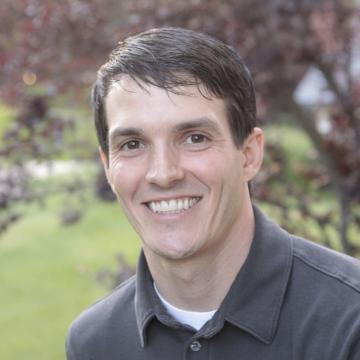
Chris Cirone '04
Pediatrician
When Chris Cirone ‘04 was an SCU senior and Hackworth Fellow at the Ethics Center, he wrote up a series of brief case studies on medical ethics he had developed as prompts for discussions with other undergrads who were considering a career in medicine. The Center then posted Cirone’s scenarios on our website. As of May 2016, those case studies have been viewed 356,933 times.
You never know how an SCU experience will blossom. Certainly Cirone, now a pediatrician, didn’t know in his freshman year when he signed up for a required ethics class with Philosophy Professor Lawrence Nelson. “The way he approaches the world changed the way I see things even today,” Cirone says. “If I could go back now and take one of his classes, I would consider it a privilege.
Nelson encouraged Cirone to get involved at the Ethics Center, which he did in a big way. Not only was he a Hackworth Fellow, but also, during his sophomore year, Cirone was in one of the earliest cohorts of the Health Care Ethics Internship, a program that allows students to shadow physicians, nurses, and other health care providers as they encounter ethical issues in their everyday practice.
Cirone can’t swear to it, but he believes that experience helped him get into medical school. During his interview at Loyola Chicago, he talked about his participation in the internship. The interviewer stopped in the middle of the proceedings to take Cirone to the Philosophy Department, where he had a long talk with the chair about ethics.
One important thing Cirone took from the internship is that ethical issues can crop up anywhere. They’re not just big, obvious dilemmas. When he first went to the hospital and began following the nurses, he remembers thinking, “They’re just giving out medicines. What could be the ethical issue there?” “But when you start paying attention,” he says, “you see it.” The ethics might have to do with patients’ access to treatment or the limits of palliative sedation or the problems of painkiller addiction.
Those lessons have served Cirone well in his private practice. He especially appreciates the training in cultural sensitivity he got from the internship: “I’m a middle class kid from the Silicon Valley. My mother is an attorney, and my father is a doctor. But when I went through the internship, I came into contact with people from different backgrounds. When I work with patients now, I’m prepared to discuss ethical issues a lot more from their perspective than I would have been had I not thought about these issues during my college years.”
To Cirone, being an ethical physician is almost synonymous with being a good physician. “I try to be very honest,” he says. “I want to make sure patients understand where I’m coming from and that I’m not misrepresenting myself and my information. Just taking the time to talk to people, to show them why we’re making a decision, is crucial. If I weren’t doing it, I would be doing a bad job as a doctor.”